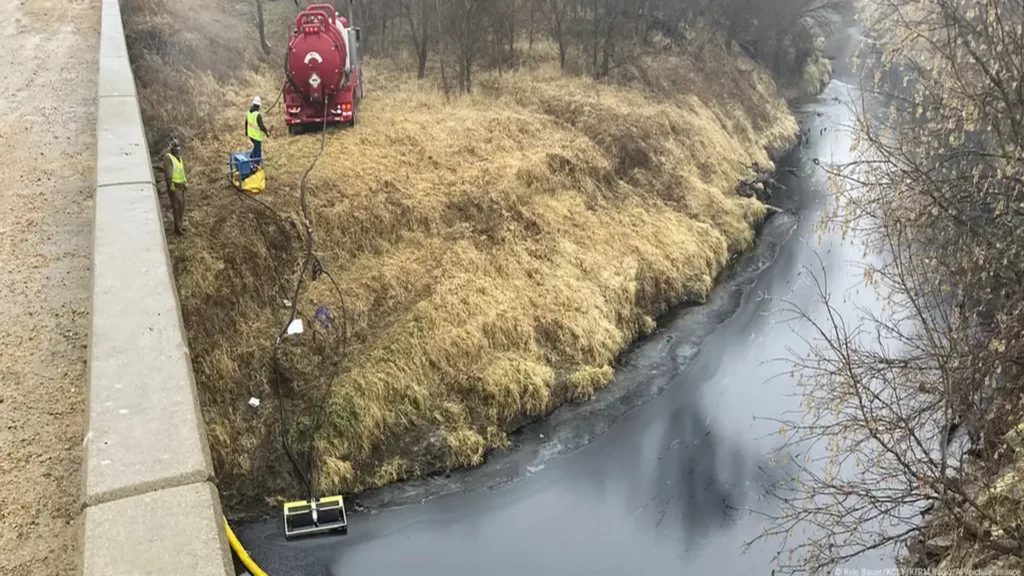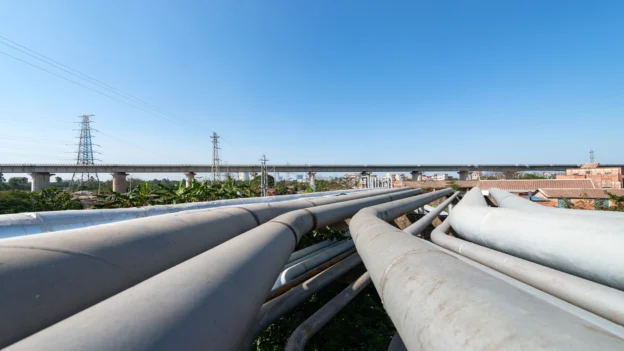Asset integrity in industrial pipelines is one of the most critical issues for the energy industry. It is not only about maintaining a continuous flow of hydrocarbons, but also about ensuring long-term safety, sustainability and profitability. Without a rigorous pipeline inspection plan and a sound asset management strategy, the risks increase exponentially: corrosion, fatigue, structural failure, spills and explosions.
Each of these scenarios compromises the reliability of oil & gas pipelines, leading to increased operating costs, regulatory penalties for non-compliance and irreversible environmental damage. Ignoring asset integrity management can result in loss of operational continuity, accelerated asset deterioration and, ultimately, operational and financial collapse for the organization.
Why it is critical in industrial pipelines
Industrial pipelines represent the circulatory system of the oil & gas sector. They transport millions of barrels of light and heavy products every day, over thousands of kilometers, around the world. Their efficiency is indisputable, but they are also highly vulnerable. Without pipeline monitoring programs, the risks multiply: leaks, spills, unplanned shutdowns and, in the worst case, explosions.
Companies that ignore the integrity of their assets face economic losses, legal sanctions and reputational damage that is difficult to recover.
Risks of not evaluating pipelines
- Technical risks: Corrosion is the most common threat. It can be external (due to humidity or coating failure) or internal (due to chemical agents in the fluid). Added to this are fatigue phenomena due to repetitive loads, vibrations from nearby equipment and mechanical impacts during operations. Ignoring these variables accelerates asset deterioration and increases the risk of massive leaks.
- Operational risks: Oil & gas pipelines that are not periodically evaluated may present pressure losses, failures in block valves, inefficiency in pumping systems and even total interruptions in the transportation chain. These events generate unscheduled shutdowns, reduce the reliability of the system and compromise the safety of operations.
- Economic risks: A single leak event can shut down operations for weeks or months. Losses include revenue interruption, cleanup costs and equipment replacement. Lifecycle cost skyrockets when corrective repairs are prioritized over preventive and predictive strategies.
- Environmental risks: Oil spills contaminate soils, rivers and aquifers. These impacts can take decades to remediate and involve millions of dollars in compensation. The loss of biodiversity and the impact on neighboring communities represent an incalculable social cost.
- Regulatory and legal risks: The industry is regulated by international standards such as API 570, API 580, API 581 and ISO 55001; failure to comply with these requirements means penalties, suspension of operations and lawsuits. Authorities require evidence of robust asset management and pipeline monitoring programs.
ALM as a critical cost avoidance strategy
Asset Lifecycle Management (ALM) is not a passing trend; it is the natural evolution of asset management in the face of risks that compromise the integrity of pipelines. ALM provides a methodological framework to anticipate failures, establish controls and mitigate risks before they become operational or financial crises.
Its implementation is articulated in five integrated phases:
- Planning and design: The right materials are selected, international standards are met and performance KPIs are defined in order to prevent early errors that make the life cycle more expensive.
- Acquisition and construction: Quality controls, document traceability and base data upload to CMMS/EAM platforms are implemented, ensuring that initial asset information is available for future management.
- Real-time operation and data: IoT sensors, SCADA systems and digital twins are incorporated to monitor critical conditions such as corrosion, pressure or vibrations, enabling early warnings to preserve operational continuity.
- Maintenance and continuous improvement: Non-destructive testing (MFL, SLOFEC, UT, PAUT, ILI) is used together with Risk Based Inspection (RBI) and predictive maintenance methodologies, orienting interventions towards the most critical sections instead of relying on unforeseen failures.
- Disposal and reconversion: Plans for environmental closure, safe decommissioning or reconversion of pipelines (e.g., use for hydrogen blending or CO₂ transport) are implemented, ensuring residual value and long-term sustainability.
Together, these practices transform asset integrity management into a competitive advantage by minimizing critical risks and maximizing the value of assets throughout their life cycle.
Benefits of implementing ALM in pipelines
The disciplined adoption of ALM offers tangible and measurable benefits.
- Proven lifecycle cost reduction: By prioritizing RBI inspections and applying ILI/END technologies, pipeline life is extended and corrective expenditures due to unplanned failures are reduced by up to 40%.
- Increased operational reliability: Data integration in CMMS/EAM and correlation with digital twins increases availability (MTBF) and drastically reduces unplanned shutdowns.
- Guaranteed regulatory compliance: Applying standards such as API 570, API 580/581 and ISO 55000 with digital traceability ensures successful audits and avoids million-dollar penalties.
- Strengthening sustainability: Risk-based decisions and asset conversion minimize emissions, spills and environmental footprint, aligning the operation with ESG standards.
- Strategic resource optimization: Consolidation of technical data makes it easier to justify investments to management, demonstrating returns in safety, continuity and operational resilience.
Together, these practices transform asset integrity management into a competitive advantage by minimizing critical risks and maximizing the value of assets throughout their life cycle.
Common mistakes when implementing ALM in pipelines
Despite its advantages, many organizations limit the scope of ALM by making recurring errors:
- Incomplete or outdated inventories: Omitting critical assets or not knowing their operating conditions prevents planning effective inspections.
- Poor data integration: When construction, initial thickness or repair information is not recorded in CMMS/EAM platforms, essential traceability for decision making is lost.
- Underestimation of specific threats: Ignoring mechanisms such as Stress Corrosion Cracking (SCC), fatigue or flow erosion leads to partial diagnoses and ineffective maintenance strategies.
- Reliance on corrective: Relying on interventions only after failure, without implementing RBI or scheduling ILI/END, raises the probability of emergencies and increases repair costs.
- Poor organizational culture: Reduced inspection budgets and failure to record lessons learned at asset end-of-life weaken continuous improvement.
These errors increase exposure to unplanned shutdowns, regulatory non-compliance and economic losses, negating the benefits that ALM brings when applied with methodological rigor.
Non-destructive testing in pipeline inspection
In pipeline integrity, In-Line Inspection (ILI), or “smart pigs”, is the most decisive method. These instrumented tools walk the pipeline detecting metal loss, cracks, deformations and mechanical damage, recording coordinates for targeted repairs. Their use is standardized in API 1163 and NACE/AMPP SP0102, which define detection, classification and sizing requirements.
The most commonly used sensors in ILI are MFL (fast coverage for metal loss), UT (thickness and crack accuracy) and EMAT (crack detection and SCC without liquid couplant), plus caliper and IMU/XYZ for ovalization and mapping. The right combination depends on the prevailing fluid, thickness, coating, velocity and threats.
ILI results must be integrated into a prioritization model. This is where Risk Based Inspection (RBI) becomes valuable: standards such as API 580/581, API 1160 and ASME B31.8S allow scheduling inspections according to probability and consequence of failure. This optimizes resources, reduces emergencies and minimizes the lifecycle cost, unlike corrective or calendar-based plans.
Key technologies to ensure integrity
- CMMS (Computerized Maintenance Management Systems): Allows the management of work orders, spare parts and maintenance backlog, avoiding hidden costs due to unrecorded failures.
- EAM (Enterprise Asset Management): Provides a comprehensive view of the life cycle, linking costs, risks and performance to prioritize investments and reduce corrective expenses.
- IoT and digital twin: Facilitates the simulation of corrosion and fatigue scenarios, anticipating failures and reducing unplanned shutdowns.
- Inspection techniques (MFL, SLOFEC, ILI, UT, PAUT): Provide highly accurate field data on corrosion, thickness loss and cracks, essential for risk-based decision making.
Benefits of implementing integrity programs
- Safety and regulatory compliance: Lower probability of incidents and penalties associated with failures.
- Reduction of unplanned shutdowns: Increased operational continuity and reduced revenue loss.
- Optimization of total cost of ownership: Investment decisions guided by risk and criticality, reducing unforeseen expenses.
- Traceable data for audits: Documentary support to ensure compliance with regulatory bodies.
- Contribution to sustainability and ESG: Reduction of spills and emissions, strengthening the company’s social license.
Case studies of real failures
Keystone – Spill at Mill Creek, Kansas (2022, USA)
In December 2022, the Keystone pipeline ruptured in a 36-inch section, releasing more than 13,000 barrels of crude oil in Mill Creek, Kansas. It was one of the most serious spills on U.S. soil, water and nearby ecosystems.
The investigation revealed that a crack linked to welding defects and fatigue was not detected in time. The event exposed failures in asset integrity and inspection management, resulting in costs exceeding US$480 million for cleanup and restoration.

Enbridge – Line 6B Breach on the Kalamazoo River (2010, USA)
In July 2010, Enbridge Line 6B ruptured and spilled more than 20,000 barrels of diluted crude oil into the Kalamazoo River in Michigan. The leak went on for hours before it was detected, contaminating nearly 60 kilometers of the waterway and forcing an unprecedented cleanup operation in the region.
The NTSB investigation concluded that the pipeline had pre-existing corrosion and cracks, coupled with deficiencies in SCADA monitoring and emergency response. The result was a cost of more than $1.2 billion in penalties, environmental remediation and loss of confidence in the company.
Conclusions
The cost of ignoring asset integrity in oil & gas pipelines is always greater than any preventive investment. Prevention relies on asset management programs, pipeline monitoring, non-destructive testing (NDT) and Risk Based Inspection (RBI) methodologies to anticipate failures and prioritize interventions.
Integrating technology tools such as EAM, CMMS and digital twins within an Asset Lifecycle Management (ALM) framework ensures a complete lifecycle view, from planning to disposal. Thus, industrial pipelines achieve greater reliability, regulatory and corrective costs are reduced, and the sustainability of the energy industry is ensured.

